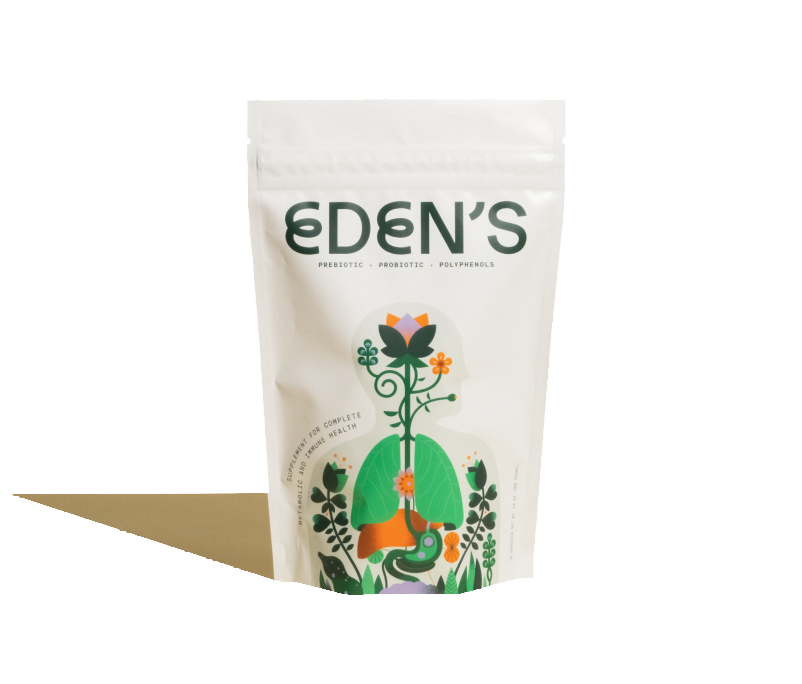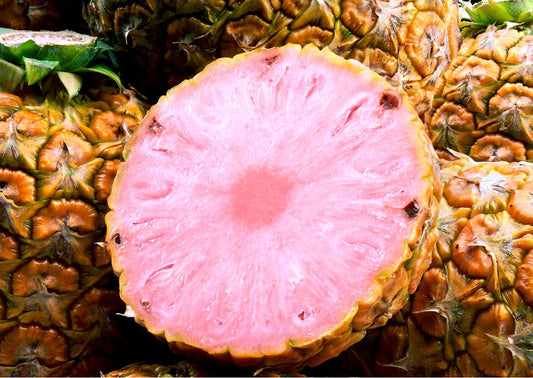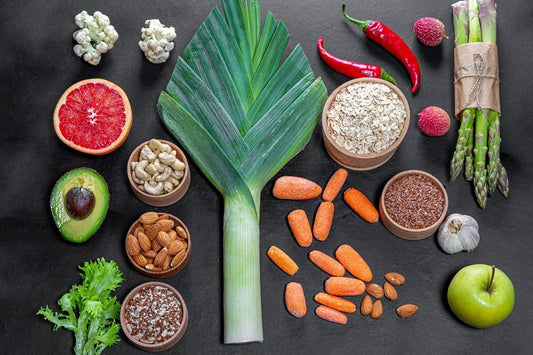Microbiome 101

Chances are you might be familiar with the widely used term “probiotics” — defined by the World Health Organization (WHO) as “live microorganisms which, when administered in adequate amounts, confer a health benefit on the host.” A lesser-known term is “prebiotics," but what are prebiotics, exactly?
Prebiotics are essentially the fuel for probiotics (those that are already in your gut and others obtained from foods, such as yogurt, or from a supplement like Eden's). Thus, prebiotics play a starring role in keeping your beneficial probiotic gut bacteria thriving, which in turn benefits your overall health in so many varied ways: improved digestive function, glucose and lipid control, immune balance, appetite regulation, brain health, and more.
This guide will explain what you need to know about prebiotics and how they work, how they impact your health, where you can find the best sources of them, and ways you can incorporate them into your daily diet. So, let's get started.
What is the role of bacteria in the gut?
Every individual has a unique profile of gut microflora, called their gut microbiome, that impacts their digestive health and influences overall health and vitality. Good bacteria are integral for a healthy digestive system, assimilation of nutrients and certain drugs, gut integrity, motility, and efficient removal of toxins and wastes. Altering the normal flora can result in colonization of pathogenic bacteria leading to gastrointestinal (GI) distress and a wide variety of other disorders.
What are prebiotics, and how do they function?
Prebiotics are non-digestible, fermentable fibers that function to stimulate growth of healthy bacteria in the digestive tract. They are thought to help promote probiotic colonization and growth by “feeding” the good bacteria in your system. In turn, those good bacteria produce metabolites, including short chain fatty acids (SCFAs,) which play a vital role in the maintenance of gut, metabolic, cardiovascular, immune, and cognitive health.
Do I need prebiotics?
The short answer: Definitely, yes, you do need prebiotics. Just like cars need gas or an electric charge to keep them going, the good bacteria in your gut need prebiotics. Without prebiotics, the bad bacteria in your gut would begin to outnumber the good, resulting in a whole host of potential negative effects ranging from digestive issues to blood sugar irregularity and chronic inflammation.
What are the benefits or prebiotics?
In 2016, a panel of experts in microbiology, nutrition, and clinical research updated the definition of a prebiotic to “a substrate that is selectively utilized by host microorganisms conferring a health benefit.” The consensus report and review of the science on prebiotics, from this same group, suggested that prebiotics:
- Help to balance healthy and unhealthy gut bacteria
- Support GI health through maintenance of intestinal wall integrity, which protects particles from getting through the gut lining and causing an inflammatory response
- Promote cardiovascular health through a downregulating effect on cholesterol and triglycerides
- Bolster brain health through an upregulating effect on general cognition, learning, and mood
- Boost a healthy immune system by impacting antibody response, immune cell function, and resolving inflammatory response
- Strengthen bone health by increasing calcium absorption
- Encourage better insulin response and blood glucose control
What are the best prebiotic foods?
Prebiotic fibers are found in many vegetables, fruits, and whole grains, including:
-
Grains: Oats, wheat bran, barley
-
Vegetables: Jerusalem artichokes, garlic, asparagus, leeks, onions, chicory, dandelion greens, burdock root, jicama, mushrooms, seaweed, beets, broccoli, Brussels sprouts, fennel, kale
-
Fruit: Bananas, blueberries, citrus, apples, pears, nectarines, watermelon, cherries, grapes, raspberries, avocados, kiwi
- Legumes/nuts/seeds: soybeans, chickpeas, lentils, flaxseeds, kidney beans, almonds, pistachios

What are the best prebiotic supplements?
As described above, prebiotics are found naturally in a wide variety of healthy foods. Additionally, they can be isolated from a variety of plant foods and used as supplemental ingredients. A growing number of health care practitioners are recommending a prebiotic supplement to enhance GI and overall health benefits, especially for those who tend to underconsume whole prebiotic-rich foods.
A walk down the supplement aisle of a health food store or pharmacy, or a glance at the dozens of online retailers, is likely to overwhelm even the savviest supplement user. Which prebiotic supplement should you choose?
Naturally, we suggest you consider Eden’s synbiotic blend, which — together with select probiotics and polyphenols — contains these five carefully selected and scientifically-vetted prebiotic ingredients:
-
Solnul resistant potato starch This fiber bypasses digestive enzymes so that it reaches the colon intact, where it feeds beneficial flora. In human clinical research, resistant potato starch has demonstrated an increase in the total amounts of both a “good” bacteria (Bifidobacterium) and total SCFAs, results associated with improvements in digestion, reduced symptoms of irritable bowel syndrome (IBS), better glucose management, and enhanced immune system function.
-
Locust Bean Gum: As a soluble fiber, locust bean gum slows the rate of food passage from the stomach to the small intestine. It has been linked to glucose management, digestive health, and reduced total and LDL (the bad kind) cholesterol.
-
Guar gum: A gel-forming fiber from the seed of the guar plant, guar gum reduces colonic transit time of food and has been suggested to improve satiety and stool quality.
-
Oat bran: This fiber is high in beta-glucan, a type of soluble fiber that slows gastric emptying, lengthens intestinal transit time, and delays sugar absorption. Oat bran has been shown to support healthy blood sugar levels and reduce the glycemic response to carbohydrate-containing foods. Additionally, it is widely known for reducing risk for cardiovascular disease, a fact recognized by the Food and Drug Administration (FDA) approval of a soluble fiber health claim in the late 1990s. Studies have also suggested that oat bran contributes to the positive modulation of gut microbes.
- Barley beta glucan: This fiber — one of the most well-studied of the prebiotic fibers — slows the gut’s absorption of bile acids, fats, cholesterol, and simple sugars. Consumption has been linked to decreased risks of heart disease, diabetes, and digestive disorders.
Can consuming prebiotics cause discomfort or side effects?
Every body reacts differently, but when introducing prebiotic fibers to your system — whether by upping your consumption of natural, whole prebiotic foods, or by taking a supplement like Eden's, there is a chance that you will experience transient undesirable GI side effects, such as gas and bloating, particularly if a large amount is consumed without allowing for acclimation to the increase in fiber intake.
It is often recommended that you take prebiotics before a meal, separate from medications, and on a consistent basis so the gut can adapt to the addition of fermentable fibers. However, there’s no “best time” except the one that works well for you; and if there is a certain time of the day that you are likely to better remember taking the supplement, then stick with it.
Eden’s daily synbiotic supplement is gentle-on-the-stomach for most users; those who are deficient in fiber may experience gas or digestive upset which is a good sign that the product is working. Typically, gut bacteria reach a place of homeostasis after a few days and digestion becomes regular with continued use.
Key takeaways
What are prebiotics? Prebiotics are fermentable fibers that promote probiotic colonization and growth by “feeding” the good bacteria in your system. Prebiotics are found naturally in a wide variety of plant-based foods, yet achieving an adequate intake from diet alone is not always easy. Supplemental sources of prebiotics have been researched for their safety and health benefits, with results pointing to potential health benefits such as reduced risk of gastrointestinal dysfunction; reduced risk of chronic, low grade inflammation linked to cardiometabolic disorders (such as diabetes and heart disease); improved glucose control; improvements in cardiovascular indicators (e.g., lower LDL cholesterol); and more.



